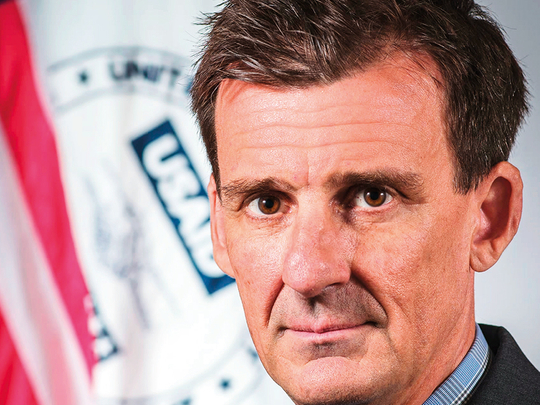
Abu Dhabi: Yemen is one of the most complicated crises the US has been involved in and the USAID is working “very closely with the Saudi-led Arab Coalition and the Emirates Red Crescent (ERC) in Yemen to help Yemenis live with dignity,” Dave Harden, Minister Counsellor for Yemen at the United States Agency for International Development, told WAM.
The US official is currently on a visit to Abu Dhabi to explore ways of broadening ties with the UAE in general and the ERC specifically on Yemen.
“This is my first visit to Abu Dhabi and my overriding impression is that the Emiratis are doing it right. They have a vision for their future and they create opportunities for next generations.”
Harden earlier served for three years as the Director for the USAID Mission to the West Bank and Gaza. He spent nearly a year and a half as the Deputy Mission Director at the USAID Mission to Iraq and three years as Senior Adviser to the Special Envoy for Middle East peace. He established the first USAID presence in Libya in 2011.
“Our partners in the Arab coalition are working to see a healthy, prosperous and unified Yemen that can contribute to the global economy. One of the reasons I’m here is to work more closely with the UAE in general and the ERC specifically. And quite recently, I have been working closely with UAE government officials on the banking crisis and economic challenges in Yemen. I personally have a long history of working with the UAE on many of the most pressing issues in the Middle East region.”
Harden believes external interference in Yemen’s internal affairs is creating more hurdles on the path towards political accommodation and peace. “If left alone, Yemenis can resolve their disputes. When external factors are in, the conflict exacerbates. We are working hard to make sure Yemenis themselves take control of their future and their political process and chart a path of political accommodation and peace.”
Harden said the previous UN-led efforts in Yemen have not failed due to “lack of trying on the part of the UN; nor does it have anything to do with certain steps that have not been taken. [There is a need] for all parties to decide the future of their children by dropping their weapons and adhering to the peace process and [a need for] addressing their grievances outside the battlefield and showing commitment to peace and prosperity”.
He is optimistic about the mission of the new United Nations Special Envoy to Yemen Martin Griffiths. “US believes the only way to end the conflict in Yemen is to adhere to UN resolutions on Yemen. The war itself has to come to an end and when the war extends beyond the borders it becomes more difficult to ... end [it]. The US is supporting the efforts led by the UN and I believe new UN envoy will succeed. He is a skilled negotiator. He has worked in complicated environments before and speculations about whether he will succeed or not don’t really matter because he is really on the ground and talking to all parties concerned. I would only counsel patience and perspective because Yemen is one of the most complicated crises we have seen. We have two options: failure or success, and we have to be patient to achieve success because failure would mean more suffering for innocent people.”
Harden sees USAID role in Yemen as more developmental. “The needs in Yemen are vast and there are 22 million Yemenis in need of humanitarian assistance, and about 11 million of them are in acute need; meaning they are desperately in need of food, water and medical care. Again the needs are huge. We provide food to the hungry. US farmers grow the food and we ship it to Yemen. We are working closely with the UN to address grave problems like cholera and sanitation. We are continuing our work to address water systems as the people there need drinkable water and proper sanitation. But we are not providing baskets of food only. USAID is working mainly on the development track. We are creating opportunities that help people live with dignity. Since early 2017 we have invested around $730 million in humanitarian aid in Yemen. We are trying to create job opportunities and help people go to school and live with dignity.”
He is very adamant that this aid doesn’t get into the wrong hands. “We are working with very trusted partners, including the UN World Food Programme and Unicef along with other international non-governmental organisations who have a track record of success in this field. We not only collaborate with these agencies, but also monitor their work and bring in third-party monitors to audit and inspect, with the fundamental goal that the people who mostly need the assistance get it. It would be a tragedy if the US tax payers’ money didn’t go to the right people. We are very adamant in giving the assistance to those in need.”
“And in this respect I believe we are on the same track with Emiratis with whom I have worked very hard on many pressing issues in the Middle East over the past years. Hopefully I will meet some UAE officials during this visit and if not we will definitely meet next week in Geneva where the UN is hosting a humanitarian appeal for Yemen to which Emiratis will be substantial contributors.”












